


Let’s make 巻き寿司 (Makizushi), and Shabu-Shabu, a year-round popular Nabe/ hotpot dish. At the end of the Shabu-Shabu, we’ll enjoy Ramen with the remaining flavorful umami packed broth!
✼••┈ Shabu-Shabu ┈┈┈┈┈┈┈••✼
"Shabu Shabu is a popular Japanese hot pot dish, featuring thinly sliced meat, usually beef or pork, cooked by quickly swishing it in broth that vegetables, mushrooms and tofu are lightly simmered in.
Our shabu-shabu is so much more. The remaining broth has a rich umami flavor that is brought out of each ingredient. You can enjoy ramen with the umami packed soup.
■Dashi/ Japanese broth
Japanese broth known as “dashi”, is more than just a broth. It’s a symphony of umami and it’s used for countless dishes in Japanese cuisine. You’ll learn how to make the most popular dashi called 一番だし (Ichiban dashi) which is the combination of Kombu/ kelp and Katsuobushi.
■Nabe no Shime
鍋の〆 (Nabe no Shime) is the final course or way of enjoying the remaining soup and ingredients after finishing a hot pot meal. Rice or noodles are used to add to the pot. In our class, you can enjoy ramen with a flavorful soup and have a satisfying end to the meal.
鍋の〆 (Nabe no Shime) brings a satisfying end to our hot pot meal. It is common to use Udon noodles or rice, but we will be using Ramen to enjoy the flavorful soup that remains.
In my class, you will:
- Master the art of making flavorful broth.
- Learn to prepare perfect sushi rice.
- Create delicious sushi rolls.
- Prepare and enjoy an authentic shabu-shabu experience.
✼••┈ Shabu shabu┈┈┈••✼
■Ingredients
・薄切り和牛 Thinly sliced wagyu
・薄切り豚肉 Thinly sliced pork
・葉物野菜 Leaf vegetables (白菜 hakusai / Chinese cabbage or lettuce. Depends on season)
・大根 Daikon radish
・人参 Carrot
・椎茸 Shitake mushroom
・エノキ Enoki mushroom
・豆腐 Cotton tofu
●Soup
・かつお節 Katsuobushi / Dried bonito
・こんぶ Kombu / Kelp
●Dipping sauce
・ポン酢 Ponzu
・ごまだれ/ Sesame sauce (白ごま White ・sesame seeds/ マヨネーズ Mayonnaise /砂糖 Sugar/ しょうゆ Soy sauce/ ごま油 ・Sesame oil /米酢 Rice vinegar)
●鍋の〆 Nabe no shime
・中華麺 Ramen noodles
・ねぎ Long onion
・ねぎ油 Onion flavored oil
・ごま油 Sesame oil
✼••┈ Makizushi/ Sushi rolls┈┈┈••✼
Today, the world is filled with a variety of 巻き寿司 (makizushi)/ Sushi rolls. Japanese households have been making this traditional food for generations. Once you master the proper way of making it, you can create your own style of Sushi roll.
■Ingredients
・海苔 Seaweed
・米 Japanese rice
・すし酢 Sushi vinegar (rice vinegar | sugar | salt)
・かんぴょう Simmered Kanpyo (Kanpyo | Soy sauce | Sugar)
・しいたけ Simmered Shiitake mushroom (Dried Shiitake mushroom | Dashi broth | Soy sauce)
・出汁巻き玉子 Japanese Rolled Omelette (Egg | Dashi broth | Sugar | Light color soy sauce | Salt)
・カニ蒲鉾 Crab flavored fish cake
・きゅうり Cucumber
✼••┈ Seasonal dessert ┈┈┈••✼
Sakura mochi (in spring)
✼••┈ Others ┈┈┈••✼
Japanese Green tea
Senbei/ Rice crackers
●Inclusions
・A small welcome senbei (rice cracker) served with Japanese tea upon arrival
・All ingredients for bento
・Use of cooking tools, apron, and indoor slippers during the class
・Presentation slides used during the lesson
・A recipe and slide reference PDF sent after the class
● Remarks
・Guests are welcome to take photos or videos during the class.
・As we change into indoor slippers, please wear socks.
・We recommend allowing a little extra time after the class before your next schedule, just in case.

Let's meet at Heiwadai station! It's a quick 7-8 minute walk to my place, and we can enjoy some fresh air and conversation on the way.
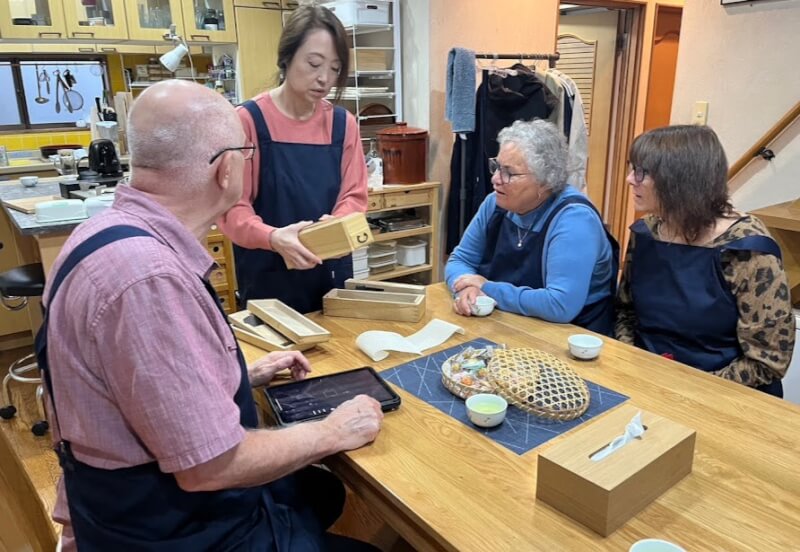
Once we arrive, feel free to make yourselves at home enjoying delicious Japanese tea and Senbei/ rice crackers while I provide a short introduction to the dishes we will make. Once our journey has ended I will send you all the slides and recipes.
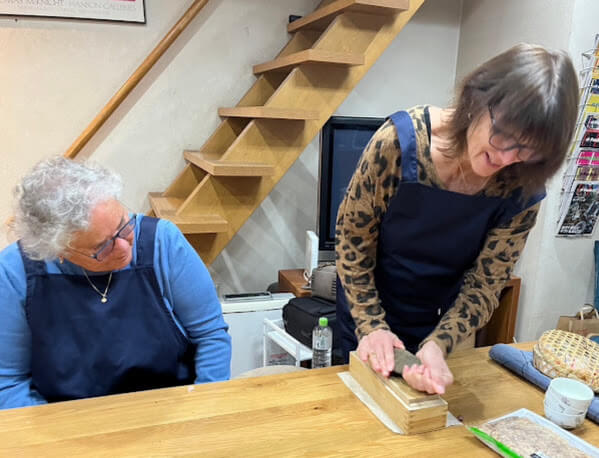
Tickle your tastebuds and sample authentic dashi broth as I present the secrets of umami.
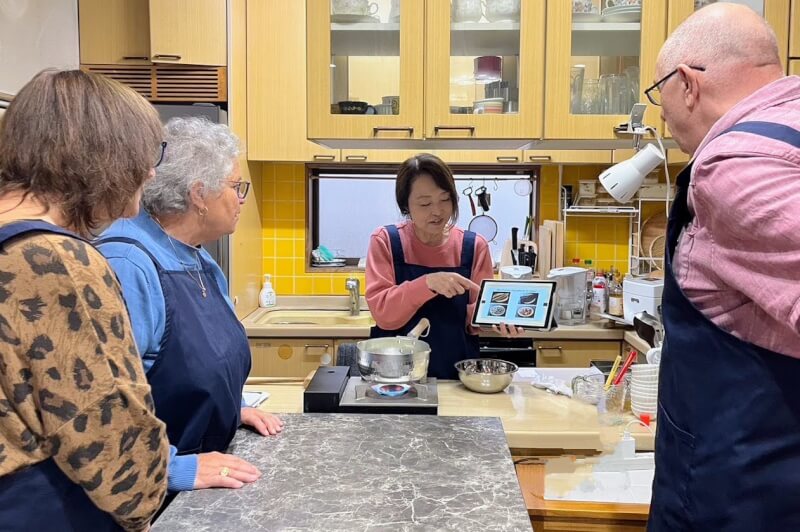
Learn the techniques of sushi masters and uncover the art of the bamboo mat.
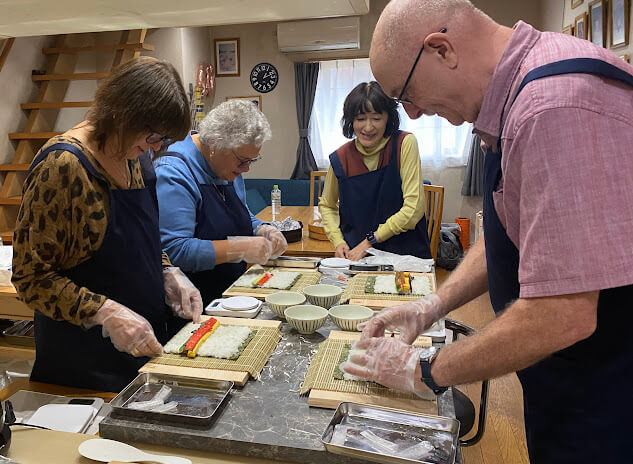
Cut, slice and arrange the freshest ingredients in a hands-on experience of guaranteed scrumptiousness!
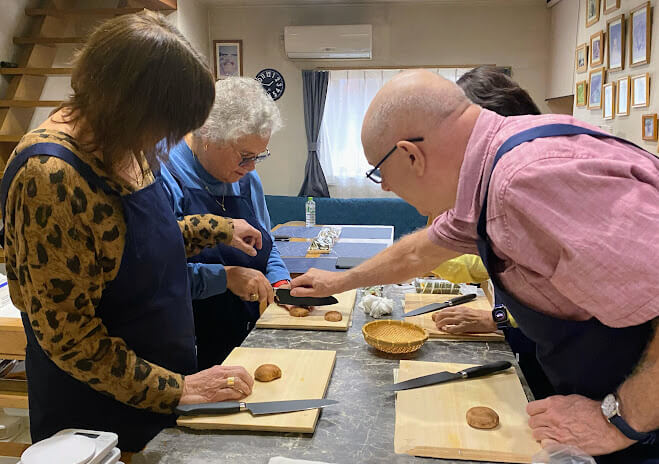
Shabu-shabu is cooked and eaten right at the table. You will learn about the table setting for hot pot dishes as well as how to eat them.
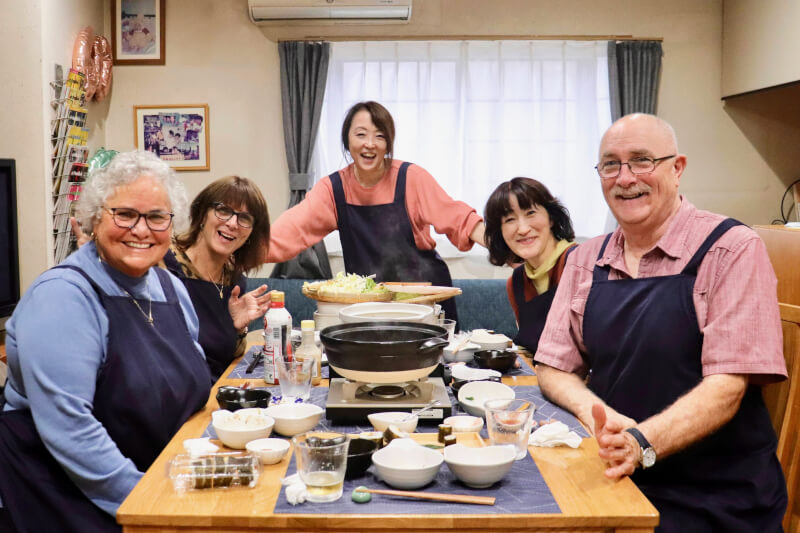
Hotpots provide a moment in time to share great food with friends and loved ones. Let’s eat, chat and laugh!
I was born and raised in Tokyo, Japan, where I raised two children. I am a licensed chef, a food education instructor, and a Japanese tea advisor. My journey began in culinary school, and I transitioned to teaching cooking, first at a culinary school and then at home. Driven by a passion for sharing Japanese cuisine, I dedicated myself to learning English. I am friendly, enjoy laughter, and love connecting with people.
The closest station
Heiwadai
How to get to the station?
From Ikebukuro station : 10mins
Free pick up service
This host can pick up you for free from the closest station!
Exact location provided after booking.
Ron, Canada
★★★★★We had a wonderful time! Not only did we learn a lot and make and eat delicious food, but Mika’s personality put everyone at ease and made us all feel welcome.
Nov 2023

Response from Mika
Thank you so much for the great review! You guys are so kind and fun. I really enjoyed cooking and eating with you and we laughed a lot in the class! I truly appreciate you all coming and I hope you come back again soon! Thank you!!!
Karen , Denmark
★★★★★We had a really great cooking class at Mikas house. She was so sweet and very helpful. We leaned a lot about traditional Japanese ingredients and how to cook them. At the end we had a very delicious meal with a great host. We would definitely recommend Mika to others.
Nov 2023

Response from Mika
Thank you so much Karen for coming. I appreciate your nice and kind review. It was a great time having such lovely guests like you guys!
Both you and Benjamin have amazing cooking skills. I was so impressed! Hopefully, I can cook with you again! Thanks again for spending time with us!
Cristina, Italy
★★★★★Amazing kitchen class Well explained and cooked Thanks a lot
Sep 2023

Response from Mika
Thank you so much for the kind words! It was an absolute pleasure to have you in my cooking class. I also appreciate you listening so intently to my explanation and how well you get along with another Japanese guest. I hope we'll have the chance to cook together again in the future. Arigatou gozaimashita.
Peter, Denmark
★★★★★The cooking experience was incredible and being invites to Mika's home made the experience feel extra authentic. We spent more than the allocated 3 hours of the cooking class, however at no extra charge which was super cool. If we are to visit Japan again we would definitely take another class with Mika's and we would encourage other travellers to do as well. All in all an incredible experience.
Jul 2023

Response from Mika
Hi, Peter. Thank you so much for coming. I appreciate you giving me such a nice review. It was a great experience for me and I had a lot of fun with the lovely couple. I'm glad you didn't mind that the lesson took a little longer than planned. I'm going to create different types of classes in the future. I would be extremely happy if you could come back to my house again. Thanks a lot for the amazing time! Mika
{{item.guest_name}}, {{item.nationality}}
{{item.comment}}
{{item.month}} {{item.year}}

Response from Mika
{{item.host_review_reply}}
It costs 15000 per person.
Up to 4 people can join Mika's cooking class.
Please go to Heiwadai which takes 10 mins from Ikebukuro station . Then Mika (host) will pick you up there!
Duration of this cooking class is 3 hours.
You will receive the confirmation within 24 hours.
We accepts these cards on airKitchen.
Cancellations up to 48 hours prior to the class begins will be fully refunded by the airKitchen cancellation policy.